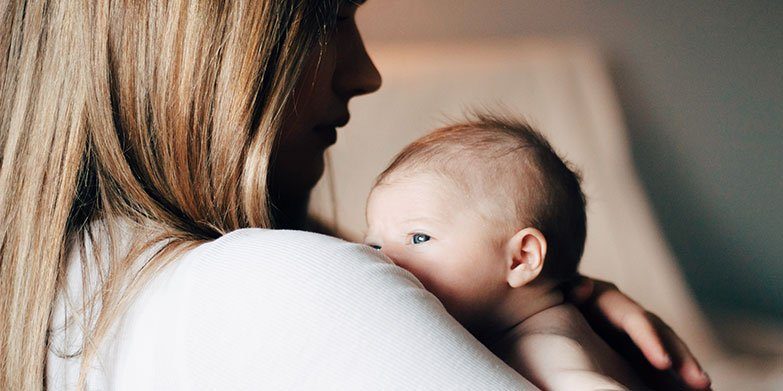The pandemic has been hard for everyone, but for people navigating the complexities of having a baby for the first time – it’s two completely new worlds to navigate. Expecting a baby can already be an anxious time for some, but the added pressures brought about by the pandemic has resulted in heightened anxiety for expectant parents across the country. Here are 7 tips to help navigate post-partum anxiety.
The research by Gidget Foundation Australia reveals more than a third (39%) of parents who have been pregnant during COVID-19 report that the pandemic and lockdowns have had a significant impact on their mental health. While almost half (43%) of expectant parents have struggled with limited access to their support networks throughout the pandemic. This data is worrying but not surprising.
Despite universal screening being in place, concerningly, one in five women in Australia are not screened antenatally and postnatally for depression and anxiety. While changes in perinatal healthcare services due to COVID-19 have resulted in expectant parents relying on Telehealth to provide stable and constant support.
One mum’s story…
Jade Tolhurst was already struggling with her postnatal anxiety when Australia went into lockdown last year. Sleep deprivation from the anxiety she had about her newborn’s sleep combined with a deep depression left her feeling sick to the stomach every evening.
Jade admits that the first few weeks after giving birth were a blur and while they were running on very little sleep, they were very much in their little love bubble. However, gradually that loved-up feeling started to fade as the sleep deprivation took over and plagued her mind with anxiety, especially surrounding her new son’s sleep. She felt like a failure when she could not get him to sleep on his own through the night.
The struggles in relation to sleep patterns went on for months and months with Jade’s anxiety soon accompanied by a dark and heavy depression. The isolation of living in lockdown for most of the year further inflated these feelings and making the situation even more overwhelming.
For months Jade felt like she was drowning, and no one knew how to save her. Eventually, she gained the courage to reach out for help and started seeing a psychologist as well as taking medication. The combination of both has relieved these feelings immensely.
There is no ‘quick fix’ when it comes to mental illness. Recovery can be a long and arduous journey. Jade is nearly 2 years postpartum now and still not completely free from depression and anxiety, however she is much more in tune with herself. Building up a support network has been an essential part of this and has helped her learn how to live with and make the most of life while navigating her mental illness.
Often mothers feel they need to just soldier on, or that asking for help means they are less capable or not good enough. The truth is that no one is expected to do this alone.
With states and territories across the country still fluctuating in and out of lockdowns and continuously changing restrictions, it seems instability is constant. But new research echoes Jade’s experience revealing how detrimental the pandemic has been for expectant and new parents.
7 tips for dealing with post-partum anxiety
Gidget Foundation Australia supports expectant and new parents through free GP referred psychological counselling sessions at varying different stages or their perinatal journey. One in five new mums and one in ten new dads experience perinatal depression and anxiety during the perinatal period so here are some tips and advice for those who need it.
1. Take a breath
Take a breath, pause for a moment and let it all sink in, allow yourself time to settle into your new life as a parent. It takes time to adjust and also to get to know your baby and learn to manage your new life.
2. Avoid pressure
Avoid putting pressure on yourself. You are in control of your own life so if there is something you don’t think you’re able to achieve one day, that is okay. Give yourself a break.
3. Lose the guilt
Try not to feel guilty. Parents often blame themselves for things that are out of their control when it comes to raising their children. Try not to burden yourself with feelings of guilt when you’re trying your best.
4. Talk
Talk about it and reach out for support. There are so many people going through the exact same thing and once you realise you’re not alone, it becomes so much more manageable.
5. Debrief
Talking to other parents or trusted friends and family can be helpful if you need to debrief or just to have someone listen to you to lessen the isolation and feel supported. Often offloading fears and frustrations is all that is needed.
6. Find support
Sometimes emotional and practical support can also help lighten the load. There are also some helpful online sources of peer support for such as the Gidget Virtual Village for both new mums and new dads/partners.
7. Seek help
If support from friends and family isn’t enough and your feelings don’t settle or lessen over time, then it may be a good idea to seek professional help. This isn’t anything to be ashamed of and there is lots of support available through organisations like Gidget Foundation Australia. You’re not alone.
Unfortunately, there is still a stigma against parents who are seemingly struggling to cope. To overcome this, people need to start talking and communities need to start listening. Then, even with the additional pressures of the pandemic and limited access to support networks, expectant and new parents will still feel able to ask for the support they know they need.












